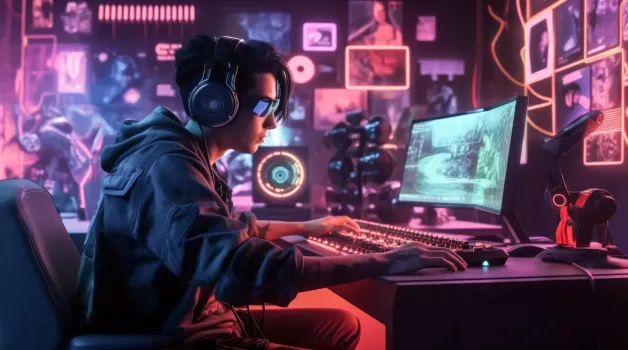In the digital age, online gaming has become more than just a pastime; it’s a thriving culture that connects people from all corners of the globe. The evolution of online gaming communities has transformed the way individuals interact, compete, and collaborate, creating a virtual society that mirrors the complexities of the real world.
The Rise of Multiplayer Games
The early days of video games were largely solitary experiences, with players competing against computer-generated opponents or striving to beat their own high scores. However, the advent of multiplayer games revolutionized the industry, allowing players to connect and compete with one another in real-time. This shift not only enhanced the gaming experience but also laid the foundation for the formation of gaming communities.
These communities are diverse and multifaceted, ranging from casual groups that come together for fun to highly organized teams that compete in professional tournaments. They provide a sense of belonging, where individuals with similar interests can share experiences, strategies, and stories. The sense of camaraderie found in these communities often transcends the game itself, leading to lifelong friendships and connections.
Social Dynamics in Gaming
The social dynamics within online gaming communities are complex and varied. They are shaped by factors such as the type of game, the competitive environment, and the communication tools available to players. For instance, massively multiplayer online games (MMOs) often require players to work together in large groups to achieve common goals, fostering a strong sense of teamwork and cooperation. On the other hand, competitive games may emphasize skill and strategy, leading to the formation of tight-knit teams that focus on winning.
Communication is a key element in these communities. The ability to chat with other players, whether through text or voice, enhances the social experience and allows for real-time collaboration. It also opens the door to potential conflicts, as the anonymity of the internet can sometimes lead to toxic behavior. However, most communities have developed ways to manage and mitigate such issues, often through the establishment of codes of conduct and the presence of moderators.
The Impact of Technology
Technological advancements have played a significant role in the development of online gaming communities. High-speed internet, advanced gaming consoles, and sophisticated software have made it possible for millions of people to play together simultaneously. Virtual reality (VR) and augmented reality (AR) are pushing the boundaries even further, creating immersive environments that blur the line between the virtual and the real.
One interesting aspect of this evolution is how it has influenced other areas of the internet. For example, platforms initially designed for gaming have expanded their reach, offering additional services like streaming, social networking, and even e-commerce. This has given rise to a new type of online presence, where users can interact with content and each other in multiple ways, all within the same ecosystem.
Conclusion
Online gaming communities are more than just groups of people who enjoy playing games together; they are complex, dynamic social networks that reflect the diverse interests and personalities of their members. As technology continues to advance, these communities will likely become even more integral to our digital lives, influencing how we connect, communicate, and collaborate online. With their ability to bring people together and create meaningful connections, the future of online gaming communities looks bright and full of potential. Amidst this dynamic landscape, platforms like 22 Bet might not be directly associated with gaming communities, but the influence of online environments on how we engage with various forms of entertainment remains undeniable. Whether through casual interaction or organized competition, the impact of these communities is far-reaching, shaping the future of online interaction.
